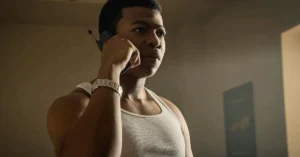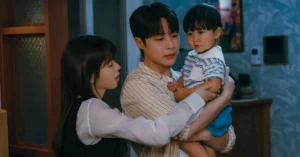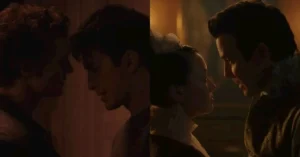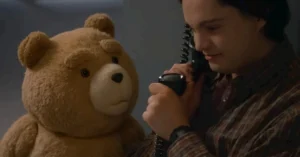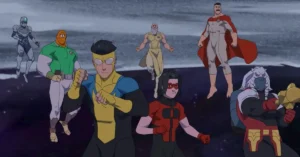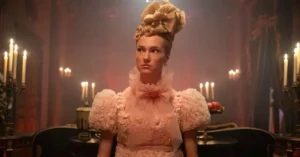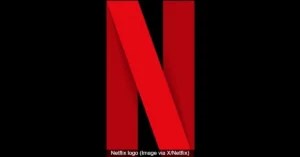The new black comedy film The Roses delivers a shocking ending that has left audiences debating what really happened to the married couple at the center of the story. Directed by Jay Roach and starring Benedict Cumberbatch and Olivia Colman, the movie follows the brutal breakdown of Ivy and Theo Rose’s marriage, culminating in a dramatic and ambiguous finale. The film is a reimagining of the 1989 movie The War of the Roses and the novel by Warren Adler.
In the final scenes, Ivy and Theo engage in a violent fight over their luxurious home. Theo uses Ivy’s severe raspberry allergy against her by nearly poisoning her, while Ivy pulls out a gun. Their confrontation turns physical, with Theo destroying Ivy’s prized Julia Child oven. As their rage peaks, they suddenly pause and honestly talk for the first time, realizing they still love each other. However, gas from the broken oven has filled the house. When Theo starts a fire for a romantic moment, the screen cuts to white.
The white-out ending strongly suggests that Ivy and Theo die in a gas explosion. The film repeatedly shows the gas spreading through the house, making survival unlikely. This tragic outcome underscores the film’s themes of miscommunication, pride, and the destructive power of unresolved resentment. Their accidental deaths occur just as they rediscover their love for each other.
How The Roses Ending Compares to the Original Film
The original The War of the Roses ended with the couple falling from a chandelier to their deaths. In that version, the characters died in hatred, with Barbara pushing Oliver away in their final moments. The new film changes this by having Ivy and Theo reconcile seconds before the implied explosion. This makes the ending more bittersweet, as their love is rekindled just before tragedy strikes.
Screenwriter Tony McNamara uses the white screen to avoid explicitly showing the explosion. This technique emphasizes the emotional impact rather than the physical disaster. It represents the sudden erasure of their lives and the end of their toxic relationship. The director, Jay Roach, acknowledges the slight ambiguity but confirms the intended tragedy.
The Real Meaning Behind the White-Out Finale
The white screen serves as a powerful symbol of the couple’s irreversible breakdown. It highlights the consequences of their failure to communicate and support each other. Throughout the film, Theo feels undermined by Ivy’s successful career, while Ivy feels unappreciated and resented. Their pride and ego prevent them from addressing these issues until it is too late.
The ending suggests that love alone cannot save a relationship without honesty and vulnerability. Ivy and Theo’s final conversation reveals their deep love, but the gas leak ensures they cannot escape the toxic environment they created. The film implies that their reconciliation might not have lasted even if they had survived, as old patterns could have resurfaced.
Director Jay Roach says, “I hope everybody walks out going, ‘They almost figured that out. They were just this far off.’” He describes the ending as a cautionary tale about resolving issues too late.
What the Gun and Oven Scenes Represent
Ivy pulling a gun on Theo symbolizes the ultimate betrayal and the depth of their rage. It is not meant to be a thriller moment but a manifestation of their emotional pain. Similarly, Theo destroying Ivy’s oven represents an attack on her identity and success. These acts show how their love has been weaponized into bitterness.
The oven also plays a practical role in the ending. Its destruction causes the gas leak that leads to the explosion. This connects their emotional destruction to physical destruction, emphasizing how their actions have consequences.
Open Threads and Unresolved Questions
The film leaves several questions unanswered. The couple’s children are away at school during the incident, and their fate is not shown. However, sources suggest they would be financially secure due to insurance policies. The story also does not reveal what would have happened to the house or the divorce settlement.
Another open question is whether Ivy and Theo would have stayed together if they had survived. Their last-minute reconciliation is heartfelt, but years of resentment might have been hard to overcome. The actors have different opinions on this.
Benedict Cumberbatch notes, “They would definitely need to go back into therapy properly and admit their failings.” Olivia Colman jokes, “They definitely have a very happy life, and they never fight again. They probably buy a little fishing boat.”
How The Roses Reflects Modern Marriage Conflicts
The film updates the original story by focusing on modern issues like career balance and shifting gender roles. Theo struggles with his wife’s success, feeling emasculated and irrelevant. Ivy grapples with guilt and isolation as a busy working mother. Their story resonates with many dual-career households today.
The movie shows how ambition and ego can strain a relationship. Theo and Ivy become so focused on winning their battle that they forget why they fell in love. Their inability to adapt to changing circumstances ultimately destroys them.
Audience Reactions and Interpretations
Many viewers find the ending deeply unsettling but impactful. The sudden cut to white leaves a lasting impression, emphasizing the tragedy of missed opportunities. Some hope the couple survived, but the evidence points to a fatal outcome.
The film encourages discussion about love, failure, and the importance of communication. It asks whether love can survive pride and resentment, and how easily relationships can deteriorate without effort and understanding.
The Roses is now playing in theaters, offering a mix of dark humor and emotional drama. The stellar performances by Cumberbatch and Colman make the story compelling, even as it heads toward its devastating conclusion.
Also Read: Emma Stone Shaved Her Head On Camera For Her Role In The New Movie Bugonia
Credits: Screen Rant, AOL


